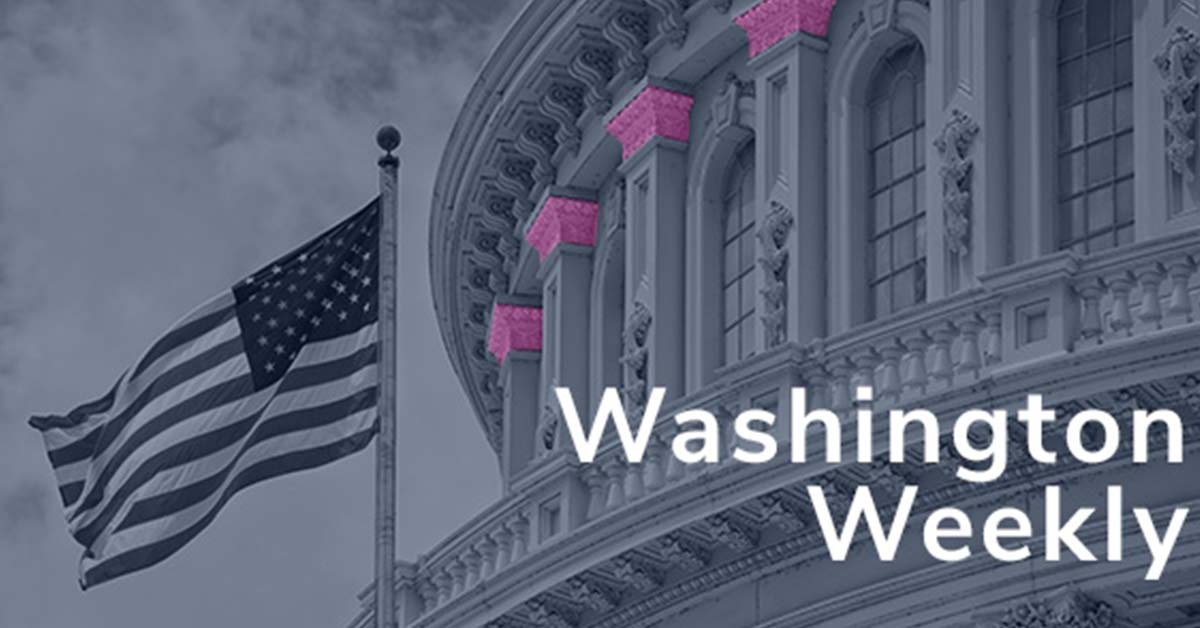Becker’s Washington Weekly: Week of June 7, 2021

The House
The House is back from its Memorial Day recess. The House Transportation and Infrastructure (T&I) Committee will consider its INVEST in America Act this Wednesday. Committee Chairman Pete DeFazio (D-OR) has touted that the Bill largely aligns with President Biden’s original infrastructure proposal. The T&I Committee is one of five Congressional committees which enacts pieces of legislation as part of the surface transportation reauthorization process, which is now underway as the current infrastructure legislation (2015’s the FAST Act) is set to expire September 30. Each committee offers a piece of a broad, five-year surface transportation infrastructure package. However, any infrastructure agreement made between the Biden Administration and Congressional Republicans in the interim would preempt this traditional surface transportation reauthorization process.
The House will also conduct numerous hearings this week. The House Homeland Security Committee will hold hearings concerning unaccompanied children at the border and the threats climate change poses to homeland security. The House Small Business Committee will hold a hearing on utilizing small contractors for the infrastructure plan. Additionally, the House Financial Services Committee will hold a hearing concerning universal vouchers’ effect on ending homelessness and expanding economic opportunity.
The Senate
The Senate is back from its Memorial Day recess this week and will resume its consideration of S. 1260, the Endless Frontier Act—sweeping legislation aimed at increasing U.S. competition with China. Two weeks ago, the bill stalled amid debate and markups. The bill would authorize over $100 billion for domestic research and development and would also provide over $50 billion in emergency spending for domestic semiconductor manufacturing. It also targets China for its intellectual property infringement and human rights abuses. Also included in the bill is broad funding for domestic sciences programs. STEM education is highly emphasized and expanded, as is funding for NASA, AI, and 5G. The bill intends to fund America’s emerging technologies supply chains to reduce foreign dependence of critical technologies, improve its national security, and invest in its own communities to do so.
This past weekend, Sen. Joe Manchin (D-WV) announced he will not support H.R. 1, the For the People Act, the Democrats’ sweeping measure to protect voting rights. The new push to pass the bill comes as many Republican State legislatures pass restrictive voting measures in response to former President Trump’s November defeat. Manchin, amongst the most moderate of Senate Democrats, penned his stance against the bill in an op-ed, citing that “partisan voting legislation will destroy the already weakening binds of our democracy.” He continued that a partisan vote on a subject so critical to American Democracy and at the forefront of the national conversation will only further divide the country. He also reiterated that he will not support weakening or eliminating the filibuster.
The Senate will conduct several hearings this week. The Senate Homeland Security and Government Affairs Committee will hold a hearing to examine the Colonial Pipeline ransomware hack. This comes as the Department of Justice announced that it recovered $2.3 million of the $4 million Colonial paid to its hacker to cease the ransomware attack. The Senate Appropriations Committee will hold a hearing on the Air Force and Space Force budget. The Senate Banking, Housing, and Urban Affairs Committee will hold a hearing on rural transit. Additionally, the Senate Environment and Public Works Committee will hold a hearing concerning the dangers of PFAS.
The Administration
President Biden and Congressional Republicans, led by Sen. Shelley Moore Capito (R-WV), will continue bipartisan negotiations towards an infrastructure agreement this week. The two parties are still separated by about $750 billion. Though both sides agree that an infrastructure package should cost around $1 trillion, they diverge over the source of that funding: President Biden wants new spending while Republicans propose the bulk of it come from reappropriating uncommitted COVID relief dollars. White House Press Secretary Jen Psaki emphasized that because the President reduced his original ask by more than $1 trillion, Republicans should also compromise by raising their ask by about $1 trillion in new spending.
This week, President Biden will travel to the United Kingdom, marking his first international trip since taking office. Vice President Harris is also traveling this week to Guatemala where she will discuss migration with the Guatemalan President. The Vice President’s trip comes after the President tapped her to lead efforts to stem immigration from the southern border. Vice President Harris will also meet with the leaders of Mexico, Honduras, and El Salvador in these efforts.
Over the weekend, finance leaders from the G7 agreed to back a new minimum global tax rate of at least 15% for companies. The agreement sets this minimum tax for companies regardless of their headquarters’ location. It would also set an additional tax on some of the largest multinational companies to pay countries where their goods and services are sold regardless of the companies’ physical presence in those countries. Treasury Secretary Janet Yellen supports this global minimum tax, ensuring that any burden on American companies would be reduced because of its global implementation.
Becker’s Federal Lobbying Team will continue to monitor these developments as they evolve and will share with you as soon as information becomes available.





